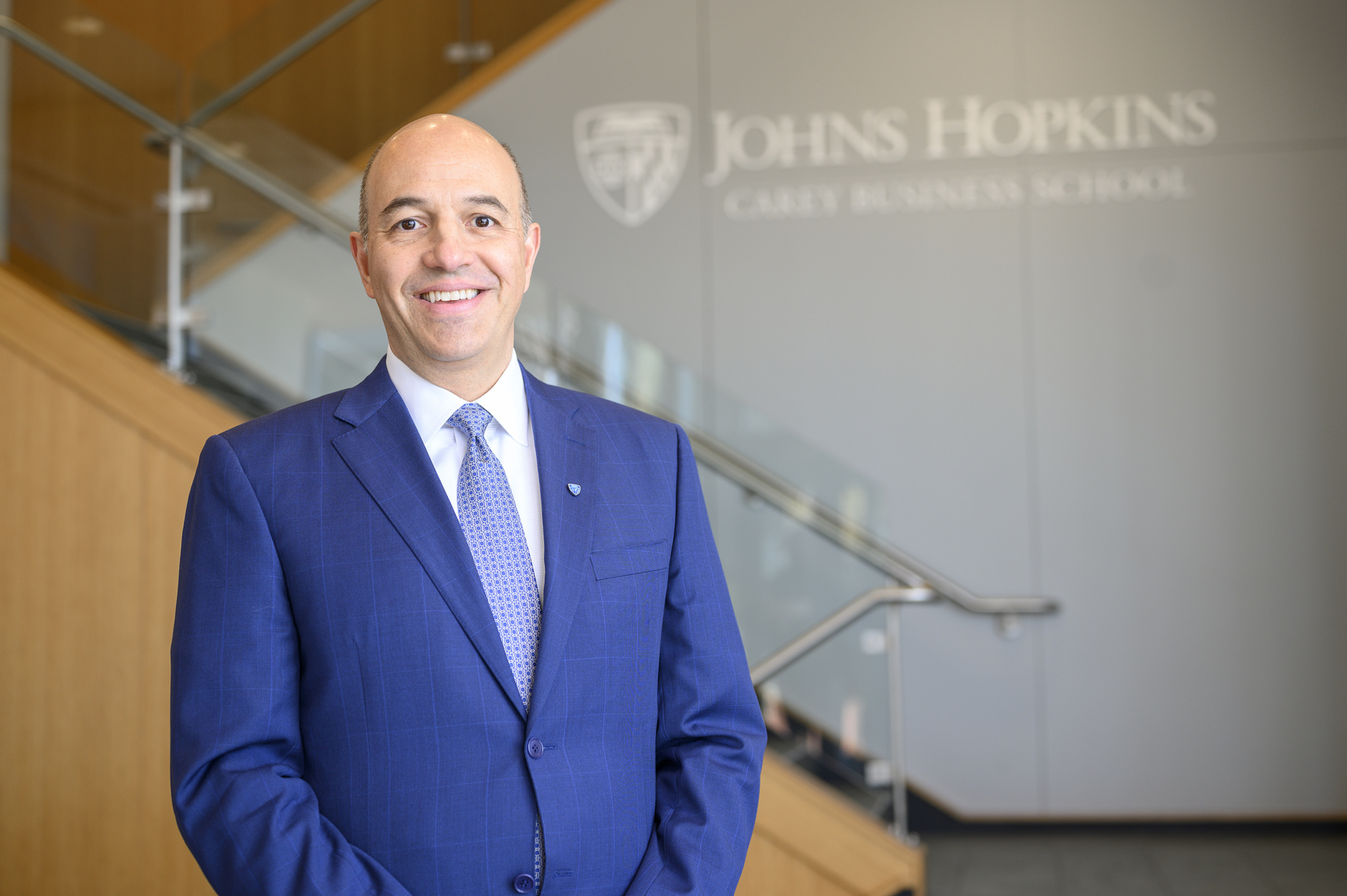
Dean's Message
We shape leaders who seize opportunities to create lasting value in an ever-changing world.
Message from the dean
It’s a pleasure to share with you the ways Johns Hopkins Carey Business School has made an impact in the last year.
In the nation’s first and most trusted research university, with the advantage of unparalleled collaborative power, Carey is leading in the business of health. A quarter of our faculty are engaged in business-of-health-related research. We have more than five dozen active interdisciplinary research efforts. Our eight business-of-health degree options —including five dual degrees that partner with the Hopkins Schools of Medicine and Nursing, the Bloomberg School of Public Health, and the Whiting School of Engineering— combine extraordinary expertise with entrepreneurial, enthusiastic, and energetic students determined to be changemakers. Our centers, including the Center for Digital Health and Artificial Intelligence and the Hopkins Business of Health Initiative, hold as paramount the responsibility and opportunity to shape the future of human health from delivery to data science to democratic policy. And because about a third of our MBA alumni work in health-related businesses or organizations that spur nearly 20 percent of the American economy, their impact is unavoidable. In this report, you will see several examples that prove it.
Because innovation depends on inclusivity and openness, we are dedicated to embracing diverse ideas, minds, backgrounds, and perspectives. For the fourth year in a row, our full-time MBA cohort is more than half-populated by women. Not only that, but half of our faculty in the full-time MBA program are women, and the program directors are women. What’s more, we actively invest in individuals from underrepresented groups preparing for leadership roles, from Day One of course work to well into their post-degree careers. Empowering themselves to speak alongside members of the LBGTQ+ community, students collaborated with a faculty member to produce an internal “Business of Pronouns” video so all faculty and staff could understand the importance of identifying individuals as they wish to be identified in order to foster belonging. Our new Human Capital Development Lab, hubbed at the striking and state-of-the-art Johns Hopkins University Bloomberg Center in Washington, D.C., works in part to support and strengthen inclusive practices in professional and policy spaces.
It takes initiative for ideas to spark evolution, so we champion experiential learning by integrating it into everything our students do. In the last year, we partnered with 74 businesses for external learning opportunities. Whether through immersive courses, team-based case competitions, individual sprint challenges, intern- or externships, no one graduates from Carey without an eye-opening infusion of what it takes to get things done.
Whether in health-related fields or not, business drives societies, and science increasingly drives business. We were one of the first 10 schools in the country with an entirely STEM-designated MBA, giving our students the edge that turns a business degree into an economic engine for a global economy and keeping outstanding international talent in the American workforce longer.
It’s because of all these things that, as I wrote this message, we learned that Johns Hopkins Carey Business School was named one of Poets and Quants’ Ten Schools to Watch in 2024.
And because faculty should be a catalyst for contribution, we intentionally invest in finding the best. In the last 15 years, we have grown our tenured or tenure-track faculty from nine to 61. Just since 2018, we’ve gone from 93 full-time faculty to 117. Eight are among the world’s most cited scientists. They come together in a “no-silos” philosophy, without formal departments, because the academic pursuits of our time require an interdisciplinarity that mirrors problem-solving outside institutional halls. It is on this foundation that the modern business school builds promise against the most pressing problems of the day. Our faculty publish not only in the most prestigious business and economics journals, but also in journals such as JAMA, New England Journal of Medicine, Nature, and Science. They have testified to Congress and federal agencies, served on Congressional Budget Office initiatives and prestigious panels, and become leading voices in the media, urging corporate and policy changes related to supply chain, health costs, and more.
In the report contained here, you will see a sampling of what Carey minds can do. It’s all rooted in our values: relentless advancement, boundless curiosity, unwavering humanity, and collaborative leadership.
It is a great privilege to serve Carey Business School, and to see our alumni and faculty serve society. I hope you find that service to be the core of our contributions offered here.
Sincerely,
Dean Alexander Triantis

Carey at a Glance
Since 2007, Carey Business School has been building on its foundations and the legacy of Johns Hopkins University with focus, determination, and accomplishment. Here are just a few of our distinctions.